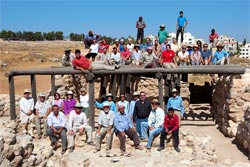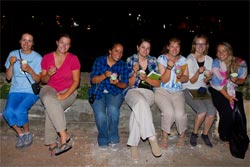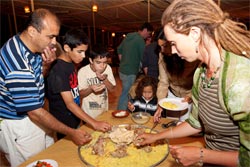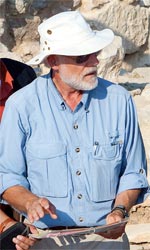Weekly Reports from Jordan
Choose Year: or Choose week
Final Impressions
Douglas R. Clark, Director
The 2012 season has been filled with impressions, some frightful, others fraught with great potential. What follows are some of my own impressions, offered on my last night this summer in Jordan at ACOR–The American Center of Oriental Research in Amman.
Impression #1 – I feel a lot older than I did a few months ago.
While enjoying an iftar dinner three weeks ago (following sunset during the month of Ramadan) at the not-quite-completed, but very nicely appointed villa of Mustafa al-Barari and his wife in Hisban, one of their precocious teen-age daughters asked me quite publicly how old I was. As any teacher would do, I responded to her question with another: “How old do you think I am?” Without batting an eyelash, she said “75.” She spent the rest of the evening explaining how good 75 was–a sign of wisdom and insight. Larry Geraty, on the other hand, she pegged at 60. A week or so later, I was at the Muqabalayn police department, getting my visa renewed in my passport for the rest of our stay. Normally, they finger print applicants (short for an entire battery of inky prints including all digits and other parts of the hand as well). When asked by Mohamad Ahmaru, the Steward at ATC where we stay, who was accompanying me, why I was not finger-printed, he was told by the police that I was an old man and probably could be trusted to stay out of mischief. This idea has been especially hard for me to accept since for many years I have claimed to be 50; I feel better, seem to have more energy, am open to new adventures at 50. Unfortunately, my two sons whose ages surround 40 are beginning to do the math and are wondering about being fathered by a ten-year-old. Since I plan to stay at 50, they will need to adjust a bit more as they grow older. Not long until this becomes a zero-sum game.
Impression #2 – I am having difficulty grasping how much good fortune we enjoyed this excavation season.
 I have long felt that for a successful social engagement one needs great food, a terrific atmosphere, and ... adequate company. Our company far exceeded “adequate” for this occasion. Not unlike the children of Lake Wobegon (apologies to Garrison Keillor), the entire team was above average, way above average! From the chief archaeologist (Kent Bramlett) to field supervisors (Stephanie Brown, Carrie Duncan, and Monique Vincent and Nikki Oakden) and specialists in technology (Matt Vincent and Larry Murrin), photography (Jillian Logee), and art (Elizabeth Monterrey); administrative and support staff (Murray Brandstater, Carolyn Waldron, Audrey Shaffer, Ruth Kent); square supervisors (Sashiere Stewart, Craig Tyson, Vera Kopecky, Cassandra Huson, Stephen Lemmer, Robyn Gray, Hew Murdoch, Erin Matthews, Kevin Burrell, Mary Boyd, and David and Amanda Hopkins); students and excavation volunteers (Tevin Maker, Nora Ramirez, Isaac Ramirez [10 -- little brother Alek (3) stayed at ATC most of the time], Nora Rebolloso, Britney Szakacs, Nicole Lalonde, Kailee Laugher, Deirdre Hackleman, Megan Bereza, Leon Kent, and double-duty multi-taskers Larry Murrin, Jillian Logee, Elizabeth Monterrey, Murray Brandstater, Carolyn Waldron, Vera Kopecky, and Audrey Shaffer); and our Bunayat boys (from the village of Bunayat two kilometers away) who worked for us, some for a generation (Abu Issa, Adel, Ibrahim, Yehyeh, Imad, Aboud, Wael, Abu Rafat, Saleh, Amjad, Bilal, Ahmad, Omar, Wasfi, and Zeid) everyone carried their load, worked hard, lived cheerfully.
I have long felt that for a successful social engagement one needs great food, a terrific atmosphere, and ... adequate company. Our company far exceeded “adequate” for this occasion. Not unlike the children of Lake Wobegon (apologies to Garrison Keillor), the entire team was above average, way above average! From the chief archaeologist (Kent Bramlett) to field supervisors (Stephanie Brown, Carrie Duncan, and Monique Vincent and Nikki Oakden) and specialists in technology (Matt Vincent and Larry Murrin), photography (Jillian Logee), and art (Elizabeth Monterrey); administrative and support staff (Murray Brandstater, Carolyn Waldron, Audrey Shaffer, Ruth Kent); square supervisors (Sashiere Stewart, Craig Tyson, Vera Kopecky, Cassandra Huson, Stephen Lemmer, Robyn Gray, Hew Murdoch, Erin Matthews, Kevin Burrell, Mary Boyd, and David and Amanda Hopkins); students and excavation volunteers (Tevin Maker, Nora Ramirez, Isaac Ramirez [10 -- little brother Alek (3) stayed at ATC most of the time], Nora Rebolloso, Britney Szakacs, Nicole Lalonde, Kailee Laugher, Deirdre Hackleman, Megan Bereza, Leon Kent, and double-duty multi-taskers Larry Murrin, Jillian Logee, Elizabeth Monterrey, Murray Brandstater, Carolyn Waldron, Vera Kopecky, and Audrey Shaffer); and our Bunayat boys (from the village of Bunayat two kilometers away) who worked for us, some for a generation (Abu Issa, Adel, Ibrahim, Yehyeh, Imad, Aboud, Wael, Abu Rafat, Saleh, Amjad, Bilal, Ahmad, Omar, Wasfi, and Zeid) everyone carried their load, worked hard, lived cheerfully.
Add to this the terrific people with whom we were blessed to work at the Department of Antiquities (Acting Director General Fares Hmoud and our two stellar representatives, Adnan Rafaiah [aka, Abu Mohamad] and Abdelrahim [“servant of mercy”] Al-Dwikat [aka, Abu Alaa]), and at ATC (especially Principal Dr. Orouba Labadi, Steward Mohamad Ahmaru, and Cook Munir [and his helpers]), and we could not have asked for better. “Queen” Victoria (Vicky) Khano at the Guiding Star Travel Agency was her usual chipper and helpful self with many things and Samer Nino arranged for our cars and buses.
The team was exceptionally productive and generous.
Impression #3 – I am really having difficulty grasping how much good fortune we enjoyed this excavation season.
Because of the land-ownership issues which clouded the weeks before and during our excavations, we decided to treat this year as if it might be our last. That was the only way we could obtain an excavation permit. This meant drawing a sharp focus on objectives which not only served us well throughout the summer in keeping us on a narrow path, but actually produced a tent-full of answers to questions which have been plaguing us for several seasons. No one expected the answers our excavations produced, especially the level of clarity of these answers – in stratigraphy, in finds, in connecting fields with each other, in understanding the buildings we were exposing, in every way.
Impression #4 – I am really seriously having difficulty grasping how much good fortune we enjoyed this excavation season.
While we don’t know yet the outcome of our sustained efforts to bring together the major stake holders in the challenge of respecting and protecting land owners and respecting and protecting the cultural heritage of Jordan’s past, there are several indicators of positive potential. Visits with land owners, tours of the site with a Senator and former Minister of Tourism (heard saying: “Problems–that’s what we deal with all the time in Jordan. No problem.”), the current Minister of Tourism, the acting Director General of the DoA, all offer promise of further collaborative efforts to acquire the land (10 hectares/25 acres), preparing the way for the establishment of an archaeological park, an outdoor museum alive with ongoing excavation and interpretive signage, observation platforms, a state-of-the-art visitors center on the model of the “four-room” house, all kinds of good things.
Impression #5 – We have all learned a lot about the holy month of Ramadan.

 While long days without food, water, smoking or other pleasures result accumulatively over the course of the month in increasingly crazed drivers on over-crowded and narrow streets throughout much of the day, by the time of the evening call to prayer and the iftar (breaking of the fast), the roads are empty and travel a breeze. Food from a menu, unavailable during the day because restaurants are closed, is more than abundant after dark and before dawn. When asked about the hardship this whole thing presents to people and their families especially during the long days of summer, most respond that fasting is a way to cleanse the body and the soul. And it’s good to draw attention to God rather than themselves.
While long days without food, water, smoking or other pleasures result accumulatively over the course of the month in increasingly crazed drivers on over-crowded and narrow streets throughout much of the day, by the time of the evening call to prayer and the iftar (breaking of the fast), the roads are empty and travel a breeze. Food from a menu, unavailable during the day because restaurants are closed, is more than abundant after dark and before dawn. When asked about the hardship this whole thing presents to people and their families especially during the long days of summer, most respond that fasting is a way to cleanse the body and the soul. And it’s good to draw attention to God rather than themselves.
So, all in all, the season has been impressive. Al-humdulillah – Thanks be to God!
